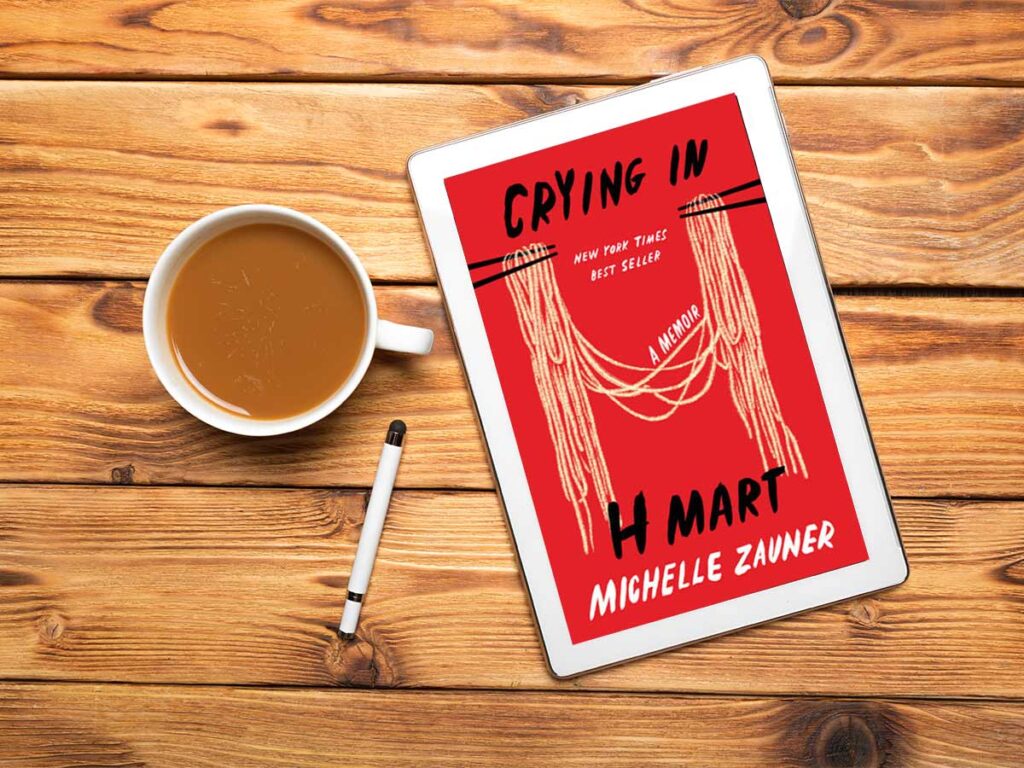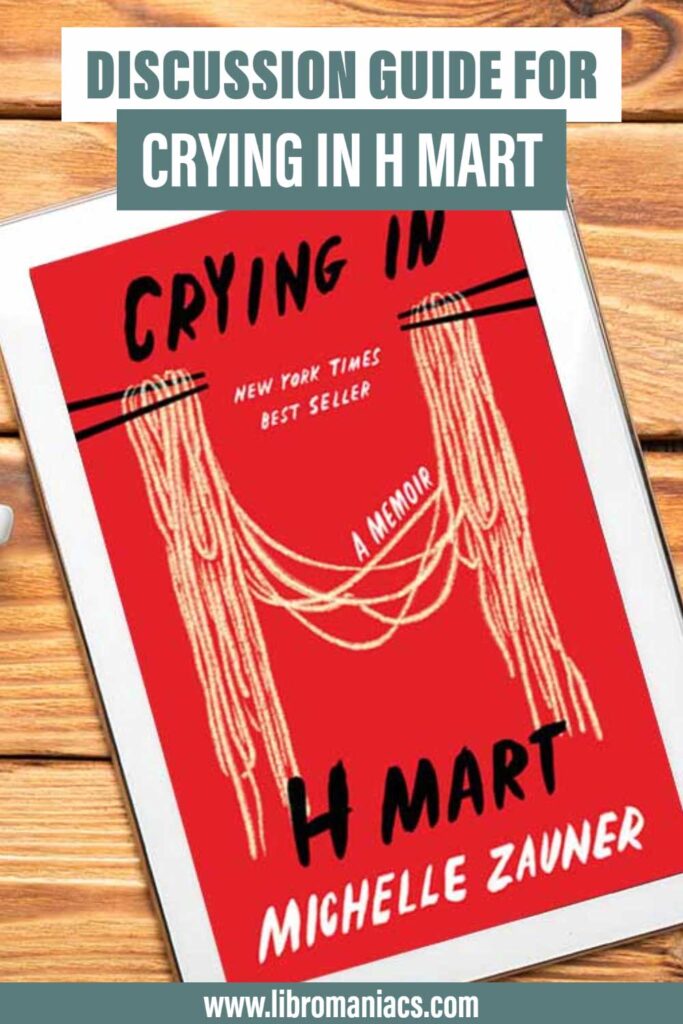The smallest and most basic parts of our lives can bring back the most searing memories and feelings. In Crying In H Mart, Michelle Zauner explores her relationship with her mother; from childhood through her mother’s death. Zauner’s memoir covers all the ways– big and small– that their relationship affected who she was and who she became. Use our Crying in H Mart book club questions to discuss Zauner’s experiences with her mother’s high expectations, her difficult death when Zauner was only 25, and her subsequent struggle with her Korean-American identity.
This memoir provides plenty to explore with the help of our Crying in H Mart discussion guide. The book club discussion questions will encourage you to explore issues of identity, mother and daughter relationships, family, culture, and grief. Also included in the guide are a book synopsis, selected reviews for different viewpoints, and recommendations for 3 books like Crying in H Mart for future reading.

(This article contains affiliate links. This means that if you choose to purchase, I’ll make a small commission.)
Crying in H Mart: A Memoir Synopsis
Crying in H Mart: A Memoir, Michelle Zauner
(We always chose to provide the publisher synopsis because we feel that it’s worthwhile to discuss whether the official book description actually squared with your experience of the book.)
In this exquisite story of family, food, grief, and endurance, Michelle Zauner proves herself far more than a dazzling singer, songwriter, and guitarist. With humor and heart, she tells of growing up one of the few Asian American kids at her school in Eugene, Oregon; of struggling with her mother’s particular, high expectations of her; of a painful adolescence; of treasured months spent in her grandmother’s tiny apartment in Seoul, where she and her mother would bond, late at night, over heaping plates of food.
As she grew up, moving to the East Coast for college, finding work in the restaurant industry, and performing gigs with her fledgling band–and meeting the man who would become her husband–her Koreanness began to feel ever more distant, even as she found the life she wanted to live. It was her mother’s diagnosis of terminal cancer, when Michelle was twenty-five, that forced a reckoning with her identity and brought her to reclaim the gifts of taste, language, and history her mother had given her.
Vivacious and plainspoken, lyrical and honest, Zauner’s voice is as radiantly alive on the page as it is onstage. Rich with intimate anecdotes that will resonate widely, and complete with family photos, Crying in H Mart is a book to cherish, share, and reread.
10 Crying in H Mart Book Club Questions
These questions have been tailored to this book’s specific reading experience, but if you want more ideas, we also have an article with 101 generic book club questions.
- Food! The book is filled with rich descriptions of Korean food. Did you relate to the connection between family and food? Did reading the book make you hungry?
- What do you think of Zauner’s father?
- “I remember these things clearly because that was how my mother loved you, not through white lies and constant verbal affirmation, but in subtle observations of what brought you joy, pocketed away to make you feel comforted and cared for without even realizing it.”
Everyone expresses their love in different ways. Have you ever examined these expressions of love in your own life?
- “Hers was tougher than tough love. It was brutal, industrial-strength. A sinewy love that never gave way to an inch of weakness. It was a love that saw what was best for you ten steps ahead, and didn’t care if it hurt like hell in the meantime. When I got hurt, she felt it so deeply, it was as though it were her own affliction. She was guilty only of caring too much. I realize this now, only in retrospect. No one in this world would ever love me as much as my mother, and she would never let me forget it.”
What do you think about the way her mother showed love, how Michelle viewed it, and how she reacted to it as she grew up?
- “I had spent my adolescence trying to blend in with my peers in suburban America, and had come of age feeling like my belonging was something to prove. Something that was always in the hands of other people to be given and never my own to take, to decide which side I was on, whom I was allowed to align with. I could never be of both worlds, only half in and half out, waiting to be ejected at will by someone with greater claim than me. Someone whole.”
What did you learn from Zauner’s struggle to reconcile her Korean and American identities? Have you ever felt something similar?
- “Every time I remember that my mother is dead, it feels like I’m colliding with a wall that won’t give. There’s no escape, just a hard surface that I keep ramming into over and over, a reminder of the immutable reality that I will never see her again.”
Have you ever experienced the loss of a parent, or someone else close to you? Do Zauner’s descriptions of grief resonate with you?
- How did Zauner reflect her mothers love as she moved into the role of caretaker? In what ways did she recognize or reuse her mother’s expressions of love and care?
- If this memoir had been written by her mother at the end of her life, how do you think she would have described their mother/daughter relationship?
- Michelle has challenges communicating with different members of her family, because of language, culture, or generational differences. How does she navigate these challenges, and how do they change over the course of the book?
- Did you learn anything new about Korean culture? Or about American culture in comparison?
Selected Reviews for Crying in H Mart
“It feels weird to rate this book, because while reading it, I felt like the book was not intended to be for anybody but the author herself. She dives into all the food associated with her culture and mother, and it feels very personal and uniquely hers. All of her descriptions and experiences are unabashedly Asian and I think many Asian-Americans will relate in some way. I also appreciate that she talked about the “ugly” sides of grief: not just the sadness with mourning, but moments of when she felt selfish and jealous over her mother’s other caretakers, arguments against her dad, etc.”
“It was okay. It is, as the title suggests, a grief memoir. The author’s regret and despair as she cares for her dying mother is palpable and tender and surely relatable, but ultimately even this binding experience does not seem to spur much deep analysis into her lived cognitive dissonance, growing up Asian-presenting to white people and white-presenting to Asian people.”
“I knew this book would be my ruin as soon as I read the opening. I knew I would cry my eyes out and kept thinking about that heart wrenching mother/daughter story for weeks because after devouring a few chapters, I already felt this was one of the books haunt you down, pushing out the feelings you kept inside, forcing you to confront with your own resentments about life and your own family.”
“I did walk away from this memoir feeling a tad disappointed. First, I felt like the reliance of the motif of food undercut some of the emotional and relational depth Zauner could have explored further, such as how she processed her grief after her mother died and how it affected her relationship with her father. More specifically, I wanted more self-exploration and interrogation of race. Zauner mentions aspiring toward whiteness in a critical way one or two times in Crying in H Mart, though she doesn’t unpack this sentiment thoroughly.”
3 Books Like Crying in H Mart
Crying in H Mart is great on audio, and if you are keen to read more memoirs from artists and musicians, check out our list of audiobook memoirs. If you want more complicated mother/daughter relationships, try I’m Glad My Mom is Dead by Jeannette McCurdy–we have a discussion guide for McCurdy’s memoir.
If you want more books that explore Asian-American’s place in American society, try our guide for Little Fires Everywhere,

Somebody’s Daughter, Ashley C. Ford
In Ashley Ford’s compelling memoir, she explores her history of growing up in poverty with an absent father in prison and a challenging relationship with her mother. She holds on to an idea of who her father could be to her, and eventually has to come to terms with the harsh reality of why he was imprisoned and the traumatic event she experienced as a teen. Her memoir is a coming of age story exploring the complicated relations between family, identity, and trauma.

Minor Feelings: An Asian American Reckoning, Cathy Park Hong
If you are interested in reading more about Korean-American identity, Minor Feelings is a great choice for your next read. In her collection of essays, Cathy Park Hong uses her own story to explore what it means to be Asian in American culture.
This mix of memoir and cultural criticism examines the relationship of race to varied subjects such as language, friendship, shame, and art. Her essays expose and validate the experiences of many Asian-Americans in everyday life and the larger racial culture of our country.

On Earth We’re Briefly Gorgeous, Ocean Vuong
Ocean Vuong’s novel gives us a beautiful and haunting story about a family’s history, their challenging yet strong mother and son relationship, and the space that separates them. This epistolary story is formatted as a letter, written in English, from a son to his illiterate mother.
Through exquisitely written vignettes of their life and history, Vuong explores race, class, love, and trauma. If you are looking for a beautifully written fictional story of a compelling mother/son relationship, this is the perfect choice.
Have a listen on Audible. Try audio books for free for 30 days.
Share these Crying in H Mart book club questions with your friends:

